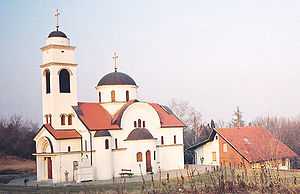Eparchy of Srem
From Wikipedia, the free encyclopedia

Eparchies and monasteries of Serbian Orthodox Church in Vojvodina
.png)
Map of the eparchies of the Serbian Orthodox Church in Serbia, showing the Eparchy of Srem.

Orthodox church in Ledinci.

St. Petka's Church, Šidski Banovci
The Eparchy of Srem (Serbian: Сремска епархија or Sremska eparhija) is an ecclesiastical territory or eparchy of the Serbian Orthodox Church in the Syrmia (Srem) region, Serbia. It is mostly situated in the autonomous province of Vojvodina, while the eparchy also include a small south-eastern part of Syrmia that belong to Belgrade as well as some Syrmian settlements that are part of Croatia. The seat of the eparchy is in Sremski Karlovci.
Monasteries belonging to the eparchy
- Beočin - The time of founding is unknown. It is first mentioned in Turkish records dated in 1566/1567.
- Bešenovo - According to the legend, the monastery of Bešenovo was founded by Serbian king Dragutin at the end of the 13th century. The earliest historical records about the Monastery are dated in 1545.
- Velika Remeta - Traditionally, its founding is linked to the king Dragutin. The earliest historical records about the Monastery are dated in 1562.
- Vrdnik-Ravanica - The exact time of its founding is unknown. The records indicate that the church was built during the time of Metropolitan Serafim, in the second half of the 16th century.
- Grgeteg - According to tradition the monastery was founded by Zmaj Ognjeni Vuk (despot Vuk Grgurević), in 1471. The earliest historical records about the Monastery are dated in 1545/1546.
- Divša - It is believed to have been founded by despot Jovan Branković in the late 15th century. The earliest historical records about the Monastery are dated in the second half of the 16th century.
- Jazak - The monastery was founded in 1736.
- Krušedol - The monastery was founded between 1509 and 1516, by bishop Maksim (despot Đorđe Branković) and his mother Angelina.
- Kuveždin - Traditionally, its foundation is ascribed to Stefan Štiljanović. The first reliable records of it are dated in 1566/1569.
- Mala Remeta - The foundation is traditionally ascribed to the Serbian king Dragutin. The earliest historical records about the Monastery are dated in the middle of the 16th century.
- Novo Hopovo - According to tradition, the monastery was built by the Despots of the Branković family. The first reliable mention of monastery is dated in 1641.
- Privina Glava - According to the legends, Privina Glava was founded by a man named Priva, in the 12th century. The earliest historical records about the Monastery are dated in 1566/1567.
- Petkovica - According to the tradition, founded by the widow of Stefan Štiljanović, despotess Jelena. The earliest historical records about the Monastery are dated in 1566/1567.
- Rakovac - According to a legend written in 1704, Rakovac is the heritage of a certain man, Raka, courtier of despot Jovan Branković. The legend states that Raka erected the monastery in 1498. The earliest historical records about the Monastery are dated in 1545/1546.
- Staro Hopovo - According to the tradition, the monastery was founded by bishop Maksim (despot Đorđe Branković). The reliable data about the monastery date back to 1545/1546.
- Šišatovac - The foundation of the Monastery is ascribed to the refugee monks from the Serbian monastery of Žiča. The reliable facts illustrating the life of the monastery date back from the mid 16th century.
- Fenek - According to tradition, the founders of Monastery were Stefan and Angelina Branković, in the second half of the 15th century. The earliest historical records about the Monastery are dated in 1563.
Seminary
The eparchy also possess an Orthodox seminary in Sremski Karlovci. The seminary was founded in 1794. It was the second oldest Orthodox seminary in the World (After the Spiritual Academy in Kyiv), and it operates to this day.
See also
- Serbian Orthodox Church
- List of the Eparchies of the Serbian Orthodox Church
- Religion in Serbia
- Religion in Vojvodina
External links
| ||||||||||||||||||||||
Coordinates: 45°12′5″N 19°56′11″E / 45.20139°N 19.93639°E
This article is issued from Wikipedia. The text is available under the Creative Commons Attribution/Share Alike; additional terms may apply for the media files.